|
This is an Acton system that requires Eagles to at least attempt to handle questions and problems themselves. They must do three things before going to myself or another Guide (the ‘G’ applies to either or both!):
When an Eagle approaches me or another Guide on campus with a question or problem, we raise three fingers to check for confirmation they have used the 3B4G system of problem solving. This process dismantles the routine knee-jerk reaction of nearly all children to immediately go to an adult to solve their problem or tell them what to do. If all three are attempted with fidelity, the Guide will offer questions and choices that will point the Eagle in a direction where they can solve the problem for themselves.
0 Comments
Research has proven that little to nothing that happens in a day-to-day learning environment will ‘stick’ if not reinforced at home. Therefore, getting value and power out of an Acton education requires a parent partnership and commitment to engaging in Acton principles at home, too. We know how busy families are, so intentionally keep our recommendations and requests few and doable. That said, the following is the minimum parents should expect to do if they want value in the Acton learning experience:
1 - Hold weekly family meetings. You’ll learn more about these over time, but they are the key to understanding your child’s learning journey and progress. 2- Attend Exhibitions & participate in giving critical feedback. Since we don’t give tests/grades and Guides don’t give feedback, Eagles rely on parents to give them feedback at Exhibition on excellence and progress. 3- Increase independence and responsibility at home. We transfer almost all of what occurs on campus to the Eagles, and they can handle and execute A LOT. Search critically for ways to encourage independence and responsibility. 4-Work hard on mindset by doing the following:
In most educational settings, learners are expected to do the same thing at the same time, get a certain minimum grade or score to move on, and then proceed with moving on (or not) at a given time, each year, in a given way. At Acton, we believe that learning is individual and, therefore, do not assign specific or common times to progress. Rather, we look for readiness and mastery when considering movement. This is relevant whether looking at how the Eagle moves through the day or how they move through their learning squads over time. Movement and Mastery Through the Day While Acton founders and guides believe in the power of choice and freedom in learning, we also know that young Heroes need guardrails to help cultivate the more deliberate practices needed to excel with independent learning and in a student-led environment. Therefore, we operate using a “Pyramid of Intentionality” which encourages heroes to develop these practices. The Pyramid of Intentionality illustrates the movement of an Eagle through our program’s learning activities each day. Consider the degree of intentionality needed to successfully participate in these learning activities. Our daily schedule supports our Pyramid of Intentionality. During the morning, all Eagles on campus work on their Core Skills. These are activities that promote the development of foundational competencies in areas like math, reading, and language. Each squad will develop their own Reasonable Minimums that Eagles will be expected to achieve during Core Skills. These minimums may speak to the amount of work to be accomplished or the level of participation or the demonstration of intentionality – or all of these. Once minimums are met, Eagles will ‘unlock’ their access to the next activity.
Getting in touch with one’s level of intentionality and control over that intentionality is the goal. As Eagles seek to participate in the many fun and meaningful activities on campus, they learn to manage their intentionality and, as a result, participate in learning with greater mastery and excellence. Because being in the studio is considered a privilege, a Hero struggling with intentionality may be tasked with an Intentionality Challenge. This will include deciding whether Resistance, Distraction, or Victimhood is the issue, and taking steps toward reclaiming intentionality. Movement and Mastery Between Squads This may be one of the more challenging concepts to contemplate and acclimate to at Acton, but one of the most important. We are all so used to a societal construct that has chopped learning into grades, and those grades start at the beginning of one school year and end nine months later. However, we know that learning and progress do not fit neatly into that model and, therefore, as much as possible, look to eliminate that construct, seeing learning as an individual journey. That said, we do see the value in loosely grouping learners based on where they are both developmentally and on that learning journey. This helps to create a sense of ‘we’ – peers to journey with and learn beside. As such, there are some commonalities among members of a squad, and recognizable signs showing when an Eagle becomes ready to move from one squad to the next. At AAM, here’s what it takes for a Hero to demonstrate readiness to move from one squad to the next:
It’s important to remember one critical thing when considering young Heroes’ abilities to be intentional in how they approach their learning; at Acton, we trust children. We believe they are capable of far more than they are often given credit for. So, please join us in being patient while our Heroes master taking over their own learning. It’s not a race to get to the end of the learning journey. It’s the meaning and ultimate joy that are of utmost importance. Acton guides and parents are reading the book The Power of Ted this spring for our book clubs! We've all found it deeply helpful for our individual Hero's Journey and for parenting and guiding young people! Check it out if you're looking for a quick, new read.
Here is the synopsis from Amazon: Escape the Grip of Drama and Take Control of Your Life The Power of TED* (*The Empowerment Dynamic) is a fable on self-leadership, because how you lead your own life has everything to do with how you lead in other areas. It is a tool for both individuals and organizations who want to create more effective communication and relationships. Learning how to transform everyday drama and opt for more growth-oriented solutions, is the priceless gift it teaches. As you walk with David, the main character, he shares how he is feeling victimized by life. Through serendipity he meets some wise guides, Ted and Sophia, who show David how he can move from feeling like a Victim to being a Creator of his own life. The Power of TED* offers a powerful alternative to the Karpman Drama Triangle with its roles of Victim, Persecutor, and Rescuer. The Empowerment Dynamic (TED) provides the antidote roles of Creator, Challenger and Coach and a more positive approach to life's challenges. The teaching story provides a guide for learning and growing through the challenges we all face in our lives. Its message resonates with everyone who, at some time in their lives, feel victimized by their situation. Having helped thousands of people and scores of organizations over the past decade, The Power of TED* (*The Empowerment Dynamic) is being published in this 10th Anniversary Edition to convey a very timely message of hope that all of life, whether at home or work, can be transformed to create satisfying and fulfilling relationships. Acton schools use the mono-myth of the Hero’s Journey to give a framework to the ups and downs of learning and of life in general. If you’re not familiar with the Hero’s Journey, check out this video on how we’re all a little like Harry Potter, Frodo, and Katniss Everdeen. As humans, we crave a life that means something to the world. This beckons us to The Hero's Journey. The Hero’s Journey is the story of an individual hero facing difficult challenges on a quest in a community in search of a worthy grail that changes the hero in the process. It is the time-tested tale of human development that has shaped civilization through the ages. Learners at Acton are Heroes -
At Acton Marietta, you’ll find a community of learners, parents, and guides ready to act as allies, helpers, and mentors on the Hero’s Journey. The community is here to help everyone as they leave the ordinary world, face the road of trials, and return home changed. Have you heard the call to adventure? Join an education revolution with us! Sign up for a discovery call today! Do you have questions, or are you ready to schedule a tour? Click here to schedule a discovery call today! The Acton model is cutting-edge for the 21st century yet incorporates tried and true methodologies from many different disciplines. You’ll see inspiration from the Montessori method, the Socratic model, project-based learning, the Democratic Schools model, and apprenticeship models. All blend together seamlessly to create the learning experience our children deserve. Acton graduates have gone on to get into the colleges and universities of their choice, from Ivy League schools to military academies. Acton graduates have gone on to launch their businesses and non-profits. Whatever they’re doing their Acton experience gave them the tools needed to find a calling and change their world. Want to learn more? Check out this web page for more about the various Acton inspirations, or watch this video with Acton founder Laura Sandefer about the origins of the Acton schools and how the model works. Do you have questions, or are you ready to schedule a tour? Click here to schedule a discovery call today! We’re not a school where you drop your children off and hope for the best. We ask that parents be the “guardrails” along with the guides. How do you do that? Three things are crucial for Acton families:
Age-appropriate independence and responsibility at an early age have long been lauded as the biggest predictor of success. That holds true for learners in the Acton model. The learners who thrive in a learner-driven environment are the ones whose home environment closely resembles the Acton model with independence and responsibility at home. Parents of children in traditional schools have told us they often feel disconnected from their child’s learning and school experience. At Acton Marietta, we ask our parents to have regular family meetings to discuss what their children have been doing at school. Families who place value on the child’s important work at school will see their learners thrive in a model like Acton. Family meetings are a chance for families to show their children that they have important work to do and give the children a chance to celebrate their successes with their families. We also ask that families attend our public Exhibitions. Acton’s Exhibitions of Learning take place at the end of four- to seven-week sprints that make up a session. Much like an agile software sprint, sessions have a real-world deliverable at the end and are presented to a live studio audience made up of more than parents. Exhibitions are performances with stakes as high as possible. We want Heroes to feel more like Steve Jobs presenting the iPhone than like a lame middle school science fair. Want to learn more? Check out this article on being an Acton parent, or watch the video below to hear how various Acton parents and founders view Acton. Want to take a deep dive? Watch this video with Acton founder Laura Sandefer about the origins of the Acton schools and how the model works. Do you have questions, or are you ready to schedule a tour? Click here to schedule a discovery call today! Maria Montessori believed deeply in the prepared environment - that if the adults set up the learning environment with care (challenging but meaningful work), learners would be empowered to learn anything and everything offered. A typical day at Acton is broken down into two main parts, with the morning being focused time on self-paced work in math, language arts, writing, reading, and target language (older learners). The afternoon is focused on collaborative, hands-on work with a real-world connection and application to science and the humanities. Here are the typical schedules for Acton learners: The Explorer Studio (ages 5-8) 8:20 Morning Circle and Mindfulness 9:00 Montessori-based Work Cycle 9:45 Outdoor Break 10:00 Montessori-based Work Cycle 11:15 Project Time 12:15 Celebration Circle 12:30 Lunch 1:00 Outdoor Play 3:00 Studio Maintenance 3:15 Closing Circle 3:25 Dismissal The Adventurer Studio (ages 8-11) 8:20 Mindfulness and Morning Launch 8:45 Core Skills 10:00 Outdoor Break 10:15 Core Skills 11:15 Lunch/Outdoor Free Time 12:15 DEAR/Read Aloud 12:45 Project Time (Science/History/Electives) 3:00 Studio Maintenance 3:15 Closing Circle 3:25 Dismissal The Navigator Studio (ages 11-14) & The Pathfinder Studio (ages 14-18) 8:20 Mindfulness and Morning Launch 8:45 Core Skills 10:15 Outdoor Break 10:30 Core Skills 11:15 Mid-morning Launch/Collab Time 12:15 Lunch/Outdoor Free Time 1:00 Socratic Discussion 1:20 Project-based Learning (Science/History/Electives) 3:00 Studio Maintenance 3:15 Closing Discussion 3:25 Dismissal Want to learn more? Check out this article on the Acton High School experience, or check out Seth Godin’s video about Acton schools. Want to take a deep dive? Watch this video with Acton founder Laura Sandefer about the origins of the Acton schools and how the model works. Do you have questions, or are you ready to schedule a tour? Click here to schedule a discovery call today! Many parents have noticed that the rigor of school content gets heavier at younger and younger ages every year. Will kindergarteners be doing calculus one day? Probably not but learning has changed drastically over the years in order to prepare for more tests. These changes have come at the expense of social and emotional learning, personal development, and outdoor play. Acton Marietta has set out to reimagine school by more thoughtfully preparing the learning environment. Acton learners are grouped by age rather than grade level into what we call “studios.” Moving from one studio to the next is determined by a number of readiness factors of the individual rather than the calendar or other arbitrary markers. Here’s a brief overview of the goals and emphasis of each studio. Want to learn more? To take a deeper dive into each studio, check our Learning Design page on our website and scroll down to the studio descriptions. Check out the video below for a Day in the Life in a typical Acton studio. Want to take a deep dive? Watch this video with Acton founder Laura Sandefer about the origins of the Acton schools and how the model works. Do you have questions, or are you ready to schedule a tour? Click here to schedule a discovery call today! The simple answer is adults get out of the way… We shared briefly in a previous email what it looks like for young people when learning gets turned upside down. But where are the adults in a learner-driven school? Won’t it be like Lord of the Flies? We get this question a lot. Imagine guardrails on either side of a highway…guides and parents act as guardrails for their learners. We give them the freedom to “drive” their learning, making choices, growing confidently in their independence, and occasionally failing but learning to get back up and to keep going. Guides protect learners from “running off the road” completely and derailing their school experience by setting schedules, leading thoughtful discussions, gamifying learning, and watching out for safety concerns. Guides create badge plans to ensure learners meet all national standards and explore the same educational content as peers in other schools but prepare the learning environment to be engaging and learner-driven rather than teacher-centric. Guides are Socratic, meaning they never answer a question directly but respond with questions or choices that support learners in discovering the answers for themselves. Guides serve as allies and helpers but are never the star of the show. So, no, it’s not like Lord of the Flies. Empowered learners are engaged and excited to learn. When given the power to self-govern, they operate in a mini-civil society with rules, structure, consequences, and meaningful rewards. When adults hold guardrails to protect and guide rather than to control and coerce, learners grow into confident, creative, and autonomous young people. Want to learn more? Check out this article on Socratic guiding, or watch the video below to learn more. Want to take a deep dive? Watch this video with Acton founder Laura Sandefer about the origins of the Acton schools and how the model works. Do you have questions, or are you ready to schedule a tour? Click here to schedule a discovery call today! |

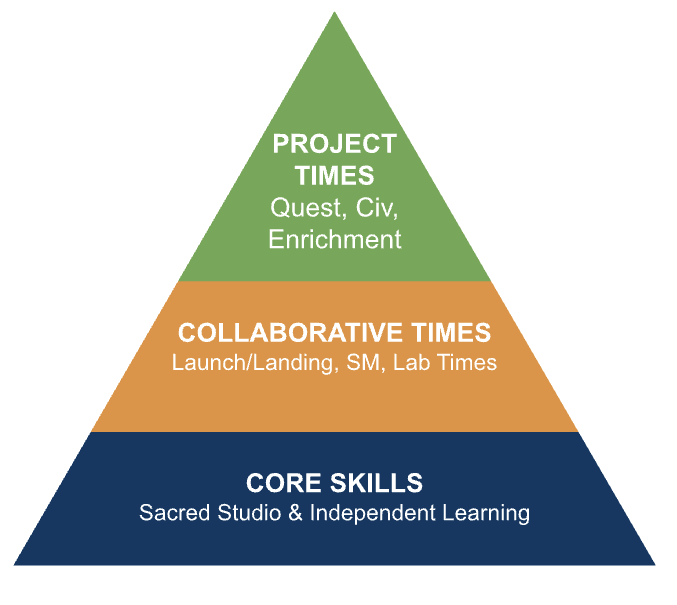

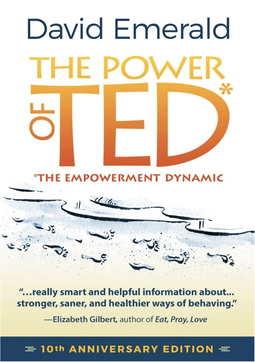
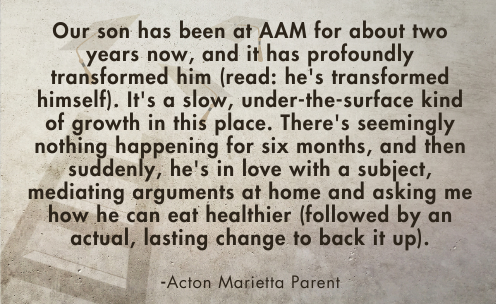
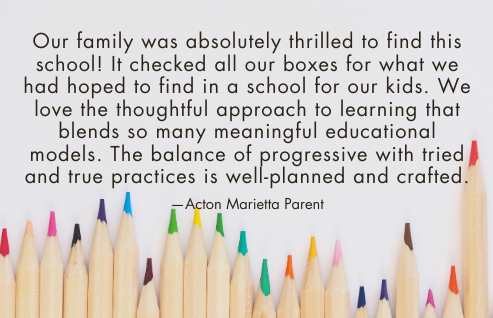
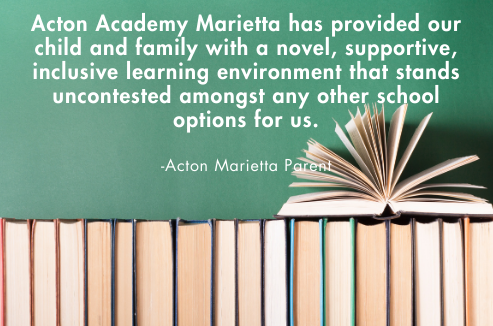
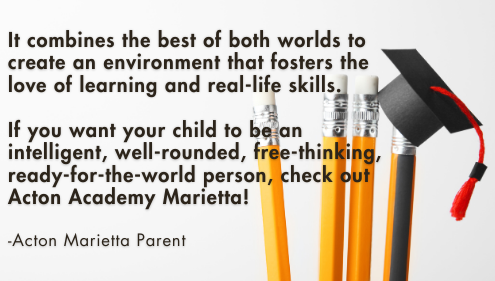
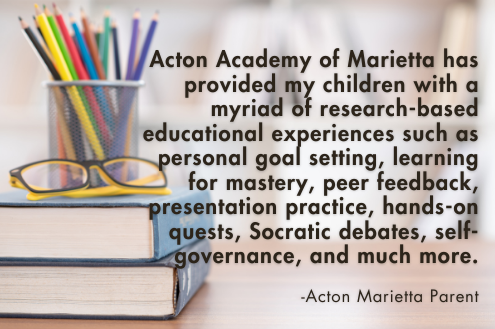
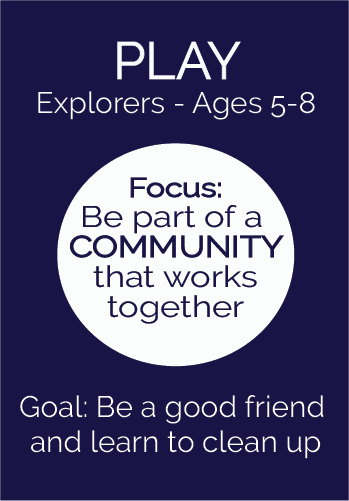
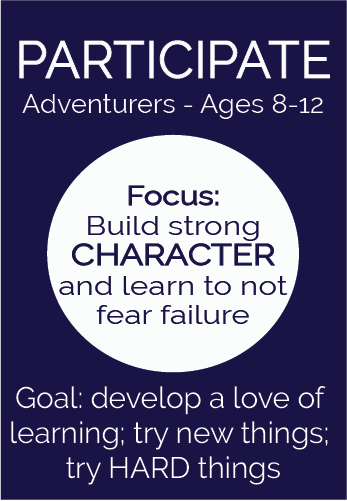
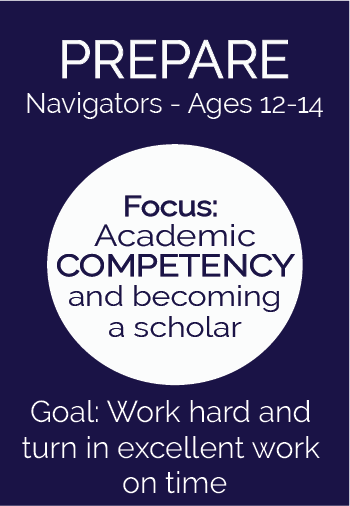
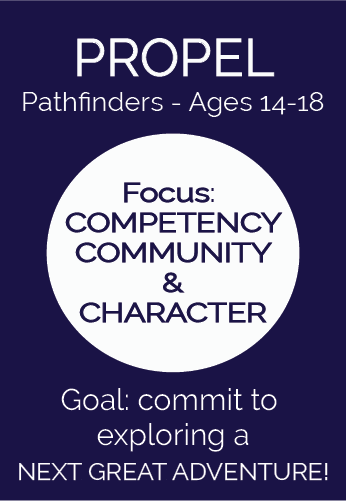
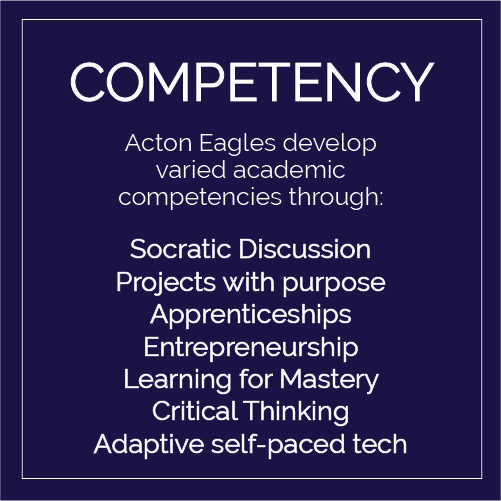
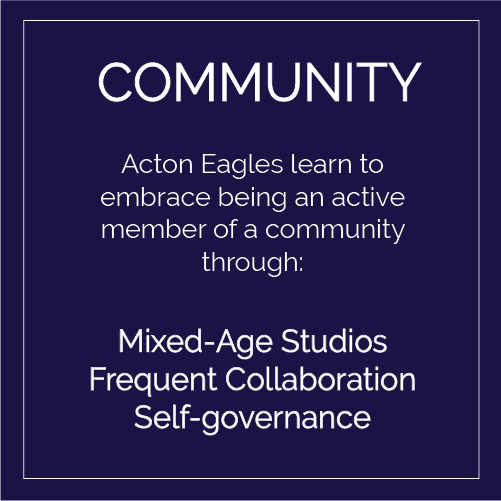
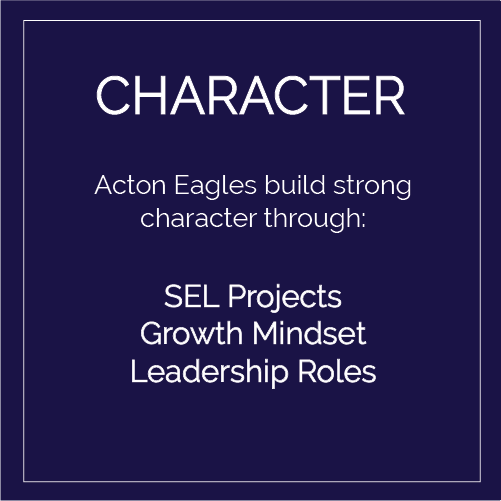
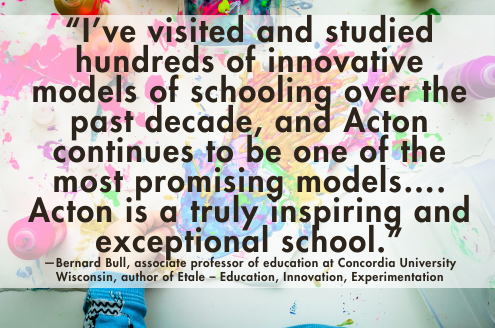
 RSS Feed
RSS Feed